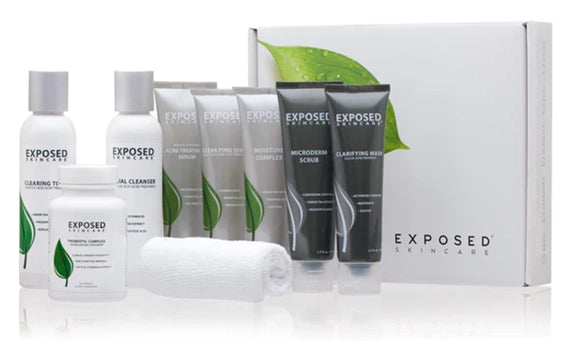When it comes to treating acne, the abundance of information and home remedies available can be overwhelming. Among the myriad of suggestions, the use of Benadryl—an over-the-counter antihistamine—has emerged as a popular but questionable choice.
Some have considered Benadryl for acne relief. However, the relationship between antihistamines and acne treatment is complex, and using Benadryl for this purpose is not as straightforward as it might seem. This article delves into why Benadryl should not be your go-to solution for acne.
Also read: How to choose the best acne treatment
Biggest Take-Aways:
- Benadryl, an antihistamine, is not an effective or recommended treatment for acne as it can lead to dryness and does not address the root causes of the condition.
- Over-reliance on Benadryl for acne can distract from seeking out proven, acne-specific treatments like benzoyl peroxide, retinoids, and salicylic acid.
- Misconceptions surrounding Benadryl and acne treatments can lead to misuse and potential skin health issues, emphasizing the need for informed skincare choices.
- Exposed Skin Care provides a targeted, scientifically formulated approach to acne treatment, integrating both advanced scientific ingredients and natural extracts for comprehensive skin health.
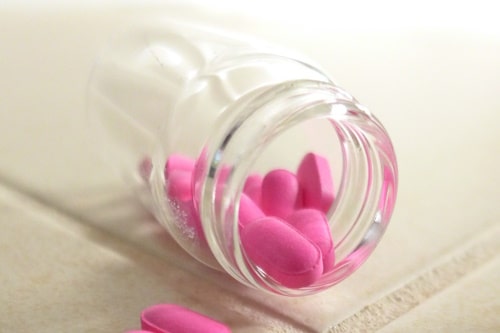
Reason 1: Misunderstanding the Root Causes of Acne
Acne is a multifaceted condition involving sebum production, bacterial growth, cell turnover, and inflammation. Histamines primarily respond to allergens, not the factors that cause acne. Using an antihistamine such as Benadryl can lead to misguided treatment that may not address the root problem.
Here are the common causes of acne:
- Bacteria vs. Allergies: Unlike allergic reactions, acne bacteria—primarily Propionibacterium acnes—thrive in clogged pores and feed on sebum, leading to inflammation and acne lesions.
- Sebum Mismanagement: Overproduction of sebum is a primary culprit in acne flare-ups, a factor that antihistamines like Benadryl do not target.
- Cell Turnover and Clogging: Dead skin cells can clog pores, leading to acne. Histamines have little to no effect on the cell turnover process.
The Complexity of Acne Lesions
Cystic acne, a severe form of acne, results from deep inflammation and cannot be managed by antihistamines. It requires treatment that can penetrate the skin layer and target the cystic lesion effectively, which Benadryl is not formulated to do.
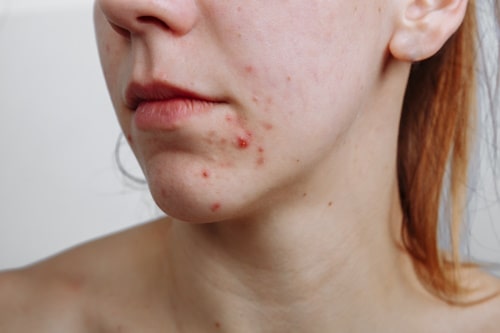
Reason 2: The Lack of Scientific Evidence Supporting Benadryl for Acne
Despite anecdotal reports, there is a scarcity of scientific evidence from controlled comparative studies to support the use of Benadryl as a treatment for acne. This lack of evidence raises concerns about its effectiveness and safety.
Scientific research in acne treatments frequently investigates benzoyl peroxide and salicylic acid, not antihistamines. Early evidence from studies investigating antihistamine as an adjuvant treatment with isotretinoin provides some insights, yet Benadryl alone is not advocated for acne.
Why Anecdotal Evidence Isn't Enough
Personal success stories or isolated improvements cannot establish the efficacy and tolerability of antihistamines for acne treatment. Rigorous scientific research is needed to substantiate any claims.
Reason 3: Potential Side Effects and Misuse Risks
While antihistamines can be helpful for allergies, their use for acne can lead to unnecessary exposure to adverse effects, including dryness, drowsiness, and more. Here are some possible adverse effects of Benadryl on your skin:
- Dry Skin: Antihistamines can excessively dry out the skin, disrupting the skin's barrier and potentially worsening acne.
- Systemic Effects: Unintended drowsiness and other systemic effects are common with Benadryl, making it an impractical choice for acne.
- Allergic Reactions: Ironically, misuse of Benadryl can lead to allergic reactions. Overuse or incorrect application on the skin can irritate and sensitize, leading to further skin issues.
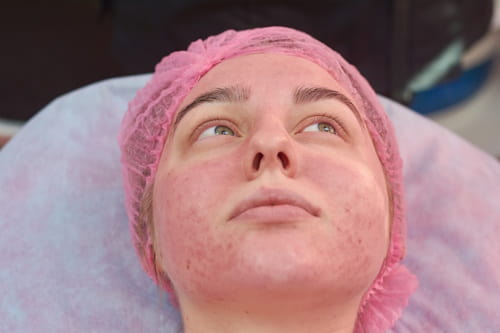
Reason 4: Misalignment with Acne Treatment Best Practices
Effective acne treatment hinges on using ingredients that directly address acne's etiology, such as benzoyl peroxide, which targets oil production and bacteria, or salicylic acid, which helps exfoliate the skin and clear pores.
Benadryl does not possess antibacterial properties, nor does it regulate oil production, making it ineffective against the primary causes of acne. Unlike treatments that promote cell turnover, Benadryl does not aid in exfoliating dead skin cells, a crucial step in preventing acne.
Why Comprehensive Acne Treatment Matters
Using a single substance like Benadryl is insufficient for acne management. A comprehensive approach often includes a combination of treatments to address various acne factors, something Benadryl cannot offer.
Reason 5: Benadryl for Acne: A Short-Term Fix, Not a Long-Term Solution
Benadryl might offer short-lived relief from itching or redness, but it does not contribute to the long-term healing process of acne or prevent future breakouts. Benadryl may temporarily reduce swelling or redness but does not affect the acne's healing process.
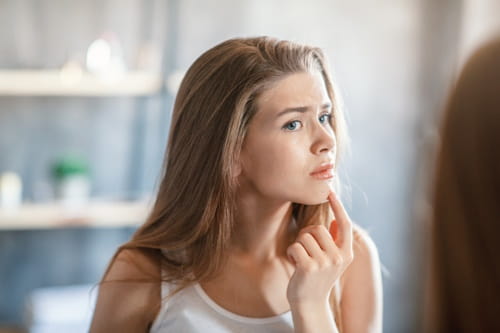
Acne requires treatments that address the underlying causes, not just the superficial symptoms. The allure of a quick fix can be tempting, but acne treatment is a marathon, not a sprint. Sustainable results come from the consistent use of appropriate skincare ingredients.
Reason 6: Disregarding the Benefits of Proven Acne Treatments
Time-tested acne treatments have a track record of effectiveness that Benadryl lacks. These include benzoyl peroxide for killing acne-causing bacteria, retinoids for promoting cell turnover, and salicylic acid for dissolving dead skin cells and clearing pores.
Established acne treatments work at the cellular level to combat the complex process of acne development. The effectiveness of traditional acne ingredients is backed by clinical research and dermatological support.
Considering Benadryl for acne can mislead individuals away from treatments that could improve their skin condition. It diverts attention and resources from more effective and specifically designed acne solutions.
The Advantages of Exposed Skin Care for Acne Management
Switching to Exposed Skin Care for managing acne offers a clear path toward healthier skin. Our globally recognized treatments provide targeted solutions that address the symptoms and the underlying causes of acne flares.
Here's why Exposed Skin Care stands out:
- Comprehensive Acne Solution: Our products are meticulously crafted to handle every aspect of acne—from the initial wash to post-treatment care.
- Dual Action Approach: Exposed Skin Care uniquely blends scientific actives and natural extracts to combat infection while soothing your skin.
- Prevents and Treats Acne Flares: Regular use helps prevent new breakouts and swiftly deals with unexpected acne flares.
- Gentle Yet Effective Wash: Our Facial Cleanser ensures a deep, purifying wash without stripping the skin's essential oils.
- Targeted for All Acne Types: Whether it's a stubborn cystic bump or non-inflammatory blackheads, our treatments are formulated to address various acne types.
- Global Acclaim: A trusted name in skincare with over 20 years of experience, our products have helped hundreds of thousands around the world in their fight against acne.
Our commitment to excellence ensures that when you choose Exposed Skin Care, you're not just treating acne; you're investing in the long-term health and resilience of your skin.
Conclusion
The quest for effective acne solutions often leads to exploring a variety of treatments. The adjuvant treatment of isotretinoin has been a cornerstone for many, offering a potential cure for severe cases. However, its use is not without challenges, particularly in managing side effects.
Research suggests that an antihistamine has a synergic effect with isotretinoin, potentially minimizing these side effects and improving patient comfort. This is crucial, as studies provide early evidence that an antihistamine may be used alongside traditional treatments to enhance efficacy and tolerability.
While combining an antihistamine with isotretinoin demonstrates promise, it's essential to remember the complexity of acne as a condition. It's not just a pimple or oily skin issue; it's a multifaceted disorder affecting the entire skin.
Desloratadine and similar compounds can calm the skin, help reduce swelling, and even play a role in preventing hyperpigmentation that often follows an acne breakout. The clinical landscape continuously evolves, with each new study offering insights that could revolutionize acne treatment.
One this is certain. A well-rounded skincare regimen is important. For those looking for a comprehensive solution, Exposed Skin Care provides a thoughtful blend of science and nature, designed to address acne from every angle – ensuring that your skin is clear, healthy, and resilient.
FAQs
Can Benadryl be used to treat acne?
No, Benadryl should not be used to treat acne. It does not address the underlying causes of acne and can disrupt the skin's natural healing process.
What effect does Benadryl have on acne?
Benadryl may temporarily reduce some symptoms like redness or swelling, but it has no effect on the acne itself or its healing.
Is it safe to use antihistamines for acne?
While antihistamines can reduce certain inflammatory responses, they are not a safe or effective treatment for acne and should not replace acne-specific therapies.
What are the side effects of using Benadryl for acne?
Side effects can include dry skin, potential worsening of acne, and misleading individuals away from more effective treatments.
How does Exposed Skin Care manage acne?
Exposed Skin Care offers a comprehensive approach to acne treatment, combining scientific ingredients and natural extracts to address acne and promote overall skin health effectively.












